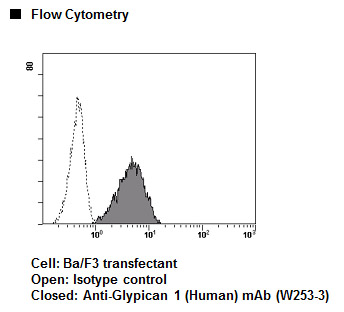Antibody detailed product information
| Code No. | W253-3 | |
| Anti-Glypican 1 (Human) mAb | ||
| Size | 100 µL (1 mg/mL) | |
| Availability (in Japan) | 10 or more
(In Japan at 00:05, Apr 19, 2024 in JST) |
|
| Clonality | Monoclonal | |
| Clone | 12C1E2F | |
| Isotype (Immunized Animal) |
Mouse IgG1κ | |
| Applications | FCM 1-10 µg/mL |
|
| Immunogen (Antigen) |
Human Glypican 1 expressed Ba/F3transfectants generated from SST-REX (signal sequence trap by retrovirus-mediated expression screening). | |
| Reactivity [Gene ID] | Human[2817] |
|
| Storage buffer | PBS/50% glycerol, pH 7.2 | |
| Storage temp. | -20°C | |
| Conjugate | Unlabeled | |
| Manufacturer | MBL | |
| Alternative names | GPC1 | |
| Background | Glypican 1 (GPC1) is a member of cell surface heparan sulfate proteoglycan family. GPC1 is a GPI-anchored type membrane protein and probably involves in the control of cell division and growth regulation. GPC1 also associates with fibrillar APP A-beta peptides in lipid rafts in Alzheimer disease brains. In pancreatic ductal adenocarcinoma, enhanced GPC1 expression is suggested to correlate with BMP and activin receptors. Down-regulation of GPC1 results in suppression of pancreatic cancer cell growth. | |
| Related products | W164-3 Anti-RHBDD3 (Human) mAb M075-3 Mouse IgG1 (isotype control) MTG-001 Clear Back (Human Fc receptor blocking reagent) |
|
| Product category | Research area:Cancer Tools:Flow cytometry reagents |
|
| Data |  |
|
| References |
|
|
- The availability is based on the information in Japan at 00:05, Apr 19, 2024 in JST.
- The special price is shown in red color.
- Please note that products cannot be ordered from this website. To purchase the items listed in this website, please contact us or local distributers.
- Abbreviations for applications:
WB: Western Blotting, IH: Immunohistochemistry, IC: Immunocytochemistry, IP: Immunoprecipitation
FCM: Flow Cytometry, NT: Neutralization, IF: Immunofluorescence, RIP: RNP Immunoprecipitation
ChIP: Chromatin Immunoprecipitation, CoIP: Co-Immunoprecipitation
DB: Dot Blotting, NB: Northern Blotting, RNA FISH: RNA Fluorescence in situ hybridization - For applications and reactivity:
*: The use is reported in a research article (Not tested by MBL). Please check the data sheet for detailed information.
**: The use is reported from the licenser (Under evaluation or not tested by MBL).
- For storage temparature: RT: room temparature
- Please note that products in this website might be changed or discontinued without notification in advance for quality improvement.
 Copyright (C)2015 Medical & Biological Laboratories Co., Ltd. All Rights Reserve
Copyright (C)2015 Medical & Biological Laboratories Co., Ltd. All Rights Reserve